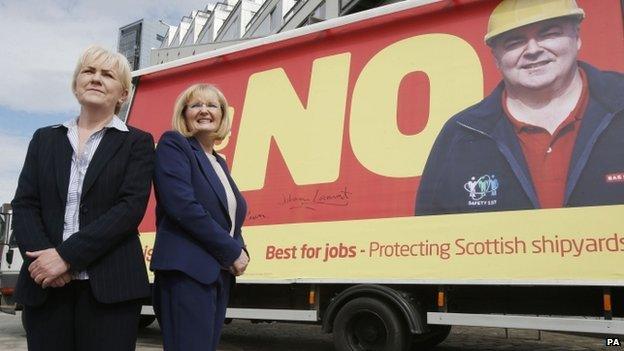Scottish and Welsh 'think big not small', says Owen Smith
- Published

The referendum is taking place on 18 September
Politicians like to tell you that their world is terribly unpredictable. Votes, reshuffles, public opinion and events, dear boy, events: nothing's a dead cert in politics, they say.
It's not true, of course. Lots of things are clearly foreseeable, some things are for certain, and one of those is that politicians, most of the time, at least, are behind the curve. The public is normally ahead of the game.
The independence referendum in Scotland is a case in point. It's a vote on national sovereignty that advocates feel they have been working towards for 50 years and more.
But I think they have missed the boat, people have moved on and the identity politics that fuelled their long march to the polls is fizzling out before nationalists' eyes.
The best Scottish evidence for this theory of mine is the attitude of young voters to the decision they have to make on 18 September.
When Alex Salmond first proposed giving 16 to 18-year-olds the vote he thought he was on to a winner.
Internationalism
Young people, he figured, were bound to be radical, and the radical choice was bound to be independence.
Well, it hasn't turned out that way at all. Polls consistently show just 20% of new voters in favour of 'Yes', with around 60% saying 'No'.
Why is this happening? I believe the answer is actually quite simple, and evident not just in Scotland, but in countries across the planet: internationalism is back.
A modern, confident internationalism for a generation that sees not just the part of the world they can glimpse through their window, but sees it all through the screens of their smart phones and the global reach of their ambitions.
Why should we think smaller, they ask? It's the world itself that's shrinking, our horizons are still expanding.

The world is shrinking and horizons expanding, says Owen Smith
And the politics of this open attitude of mind are correspondingly outward looking. They favour alliances and unions, mutual support and connectivity, and they reject introversion and isolation.
Success in this modern mind-set comes through networked endeavour not solitary strength.
Tax avoidance, climate change, corporate power, cyber-terrorism: the modern generation know we can't tackle these foes on our own. Socialism in one country is never enough.
This, make no mistake, is a sea-change in attitudes, because for much of the last 20 years, at least, Mr Salmond might well have found young people on his side, attracted to the notion of branching out on their own, as Scotland.
Just as Welsh nationalism proved attractive for some young radicals in Wales.
But that cycle of identity seems to have turned and, as I said, it's not just in Britain where attitudes are changing and secessionist movements stalling as result.
In the last few months the UN, OECD and others have all predicted that, on current trends, nationality will soon be of marginal significance as a marker of identity, as global, real and virtual communities of interest supplant and supplement the local.
Security and economic opportunity, lifestyle trends and technology are driving us together, not apart, in so many spheres. Why should politics be different?
In my view, it isn't. Powered by its young people, Scotland will vote no to independence. Similarly changing, Wales may never want to vote on the question.
So politicians had better catch up with the play and get with delivering what people want: the national and the global, or devolution within the Union, if you like.